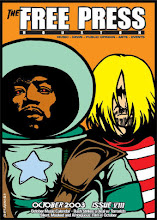Children of Men

Children of Men takes its viewer through an odyssey of future terror, at a time (2027) when the mankind has become infertile. Also important is the emergence of director Alfonso Cuaron as the technical wizard of the trio of Mexican filmmakers (Alejandro Innaritu and Guillermo Del Toro) currently burning up the charts. Children of Men creates magic in some sustained long takes that involve as elaborate a kind of choreography as anything seen in a staged team of dancers.
The story, set in a totalitarian U.K., follows Clive Owen as he’s brought back from his dulled sense of reality after being contacted by a long-ago love interest (Julianne Moore). She heads a terrorist cell (for want of a better description) that seeks to protect and smuggle out of the country the first woman to become pregnant in a generation.
COM pads out its agitprop with some remarkable action scenes, one involving a complicated camera set-up that’s attached to a van being pursued by motorcycles in a forest. The film’s strength is the way it alternates the action with commentary on the pitfalls of technology. Scenes with supporting actors like Danny Huston and Michael Caine resonate its dsytopian presence. For instance, Caine lives in hidden seclusion in the countryside, bidding his time listening to classic rock and caring for his sick wife. You would think he was still in the 60s. Meanwhile Huston plays an upper class friend of Owens who just happens to have the world’s raided art (a Michelangelo statue with a fake leg, Picasso’s Guernica) in the alcove and living room of his stately home.
While COM may not be an accurate prediction of future occurrences, you’re so caught up in Owen’s state of duress under attack that it’s easy to confuse the future depicted here with current events. At its conclusion, the future is rooted in the past.








